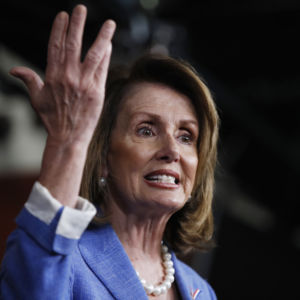Democratic leaders unveiled the latest addition to their worker-centered platform Wednesday, but the proposed plan has faced criticism from Republicans for favoring union bosses at the expense of workers.
President Donald Trump was able to win the election with strong support from working-class voters. Democrats have responded by refocusing their economic platform to win back that voting block. “A Better Deal” was unveiled by Democratic leadership July 24 as a new economic agenda focused on the working-class. The plan primarily covered wages, jobs, and training.
Democratic House Minority Leader Nancy Pelosi and Senate Minority Leader Chuck Schumer joined labor union officials to unveil the latest addition to their plan. Among the key proposals are stiffer penalties on businesses for misclassification of independent contractors, mandatory mediation and arbitration, a ban on right-to-work, and a shorter timeline for union elections. Democrats argue the added provisions will help further protect workers by strengthening their ability to negotiate.
But Republicans on the House Education and the Workforce Committee counter that the proposal would actually benefit unions at the expense of workers.
“Let’s be clear what this is really about,” Bethany Aronhalt, a spokeswoman for the committee, told InsideSources. “Big Labor knows the only way they’re going to get a ‘better deal’ is at the expense of worker rights.”
A Better Deal has still gained plenty of support despite the criticism. United Food and Commercial Workers President Marc Perrone praised the decision for strengthening the collective voice and negotiating rights of workers. The AFL-CIO praised Democrats for implementing a true workers’ rights agenda.
“I’m proud to stand with them as the Democratic Party embraces strengthening unions and expanding collective bargaining as a core value and necessary element of a fair and growing economy and a strong democracy,” AFL-CIO President Richard Trumka said in a statement. “We’re leading with our issues and engaging working people at every level, every day.”
Democrats argue that many workers choose not to join a union out of fear of retaliation from their employers. But the proposal might actually limit workplace rights. Democrats note that their proposal will ban state laws that undermine worker freedoms to join together and negotiate. No such state law exists because such actions would be barred by federal labor law.
Democrats are actually referring to a state law known as right-to-work. The policy outlaws mandatory union dues or fees as a condition of employment. States that have enacted the policy simply allow workers to choose whether they want to fund their workplace union. It does not ban workers from joining a union if they so choose.
Former President Barack Obama oversaw several notable expansions of federal labor policy during his time in office. Those reforms have faced legal and congressional scrutiny with critics contesting the changes went well beyond what the law allows. Some critics even countered the changes helped unions and hurt workers. A Better Deal seeks to enforce some of those reforms.
A Better Deal includes provisions intended to speed up the union election process. The last administration tried to enact a similar policy which critics denounced by calling it the ambush election rule. Supporters argued it was to prevent delay tactics by employers, while critics countered it gave employees little time to understand the full ramifications of unionization.
“Democrats and union bosses have tried desperately to jeopardize the privacy of workers in union elections, give workers less time to make a decision on whether joining a union is right for them, and take away secret ballot protections,” Aronhalt said. “They couldn’t be more out of touch.”
Democrats are also pushing for streamlining the National Labor Relations Board (NLRB), which was at the forefront of implementing pro-union reforms during the last administration. The agency was able to essentially create new policies by changing how it interpreted workplace dispute cases. It tackled issues like union elections, how companies can contract together, and how contract workers are classified.
Republicans and the business community have been highly critical of those reforms. The last election gave the GOP the control it needed to rollback the changes. The party has proposed legislation that is intended to counter the election rule, preserve secret ballot elections, and give workers more control over what personal information unions can obtain from them.
A Better Deal will also push employers toward accepting unionization campaigns. The proposal creates a mandatory mediation and arbitration process that compels employers to reach a first contract after being unionized. It would also allow the federal government to implement policies and pull financial support from companies in order to encourage union bargaining.
The Democratic proposal could also potentially allow unions to organize a workplace even if they lost the election. Employers that hold mandatory meetings during unionization drives to explain their views will be required to start bargaining whether the majority of workers agreed to unionization or not. The NLRB will simply set the ballots aside.

